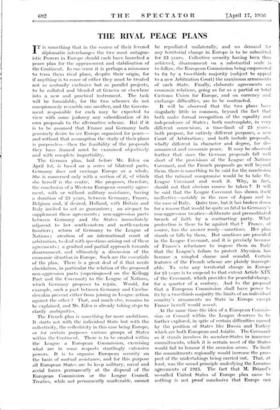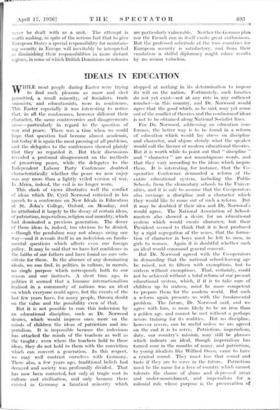THE RIVAL PEACE PLANS
IT is something that in the course of their fevered diplomatic interchanges the two most antagon- istic Powers in Europe should each have launched a peace plan for the appeasement and stabilisation of the Continent. In one sense it is perhaps a misnomer to term them rival plans, despite their origin, for if anything is to come of either they must he treated not as mutually exclusive but as parallel projects, to be collated and blended at Geneva or elsewhere into a new and practical instrument. The task will be formidable, for the two schemes do not conspicuously resemble one another, and the Govern- ment responsible for each may be expected to view with some jealousy any subordination of its own proposals to the alternative scheme. But if it is to be assumed that France and Germany both genuinely desire to see Europe organised for peace— and without that assumption the study of their plans is purposeless—then the feasibility of the proposals they have framed must be examined objectively and with complete impartiality.
The German plan, laid before Mr. Eden on April 1st, is based on a series of bilateral pacts. Germany does not envisage Europe as a whole. She is concerned only with a section of it, of which she herself is the centre. She proposes, therefore; the conclusion of a Western European security agree- ment, with or without military assistance, having a duration of 25 years, between Germany, France, Belgium and, if desired, Holland, with Britain and Italy invited to act as guarantors ; an air-pact to supplement these agreements ; non-aggression pacts between Germany and the States immediately adjacent to her south-eastern and north-eastern frontiers ; return of Germany to the League of Nations ; creation of an international court of arbitration, to deal with questions arising out of these agreements ; a gradual and partial approach towards disarmament, and ultimately a discussion of the economic situation in Europe. Such are the essentials of the plan. There is a great deal of it that needs elucidation, in particular the relation of the proposed non-aggression pacts (superimposed on the Kellogg Pact and the Covenant) to the League of Nations, which Germany proposes to rejoin. Would, for example, such a pact between Germany and Czecho- slovakia prevent either from joining in League action against the other ? That, and much else, remains to be explained, and Mr. Eden is already taking steps to clarify ambiguities.
The French plan is something far more ambitious. It starts not with the individual State but with the collectivity, the collectivity in this case being Europe, or for certain purposes various groups of States within the Continent. There is to be created within the League a European Commission, exercising what are in some respects startlingly extensive powers. It is to organise European security on the basis of mutual assistance, and for this purpose all European States are to keep military, naval and aerial forces permanently at the disposal of the European Commission or the League Council. Treaties, while not permanently unalterable, cannot he repudiated unilaterally, and no demand for any territorial change in Europe is to be submitted for 25 years. Collective security having been thus achieved, disarmament on a substantial scale is to follow, the European Commission being empowered to fix by a two-thirds majority (subject to appeal to a new Arbitration Court) the maximum armaments of each State. Finally, elaborate agreements on economic relations, going as far as a partial or total Customs Union for Europe, and on currency and exchange difficulties, arc to be contracted.
It will be observed that the two plans have singularly little in common, beyond the fact that both make formal recognition of the equality and independence of States ; both contemplate, in very different connexions, a time-limit of 25 years ; both propose, for entirely different purposes, a new Court of Arbitration ; and both include proposals, wholly different in character and degree, for dis- armament and economic peace. It may be observed further that since the German proposals fall well short of the provisions of the League of Nations Covenant, and the French proposals go Well beyond them, there is something to be said for the conclusion that the rational compromise would be to take the League Covenant and work it. Why, in fact, should not that obvious course be taken ? It will be said that the League Covenant has shown itself ineffective—notably in the case of Japan and in the case of Italy. Quite true, but it haS broken down for a reason that would be quite as fatal to Germany's non-aggression treaties—deliberate and premeditated. breach of faith by a contracting party. What protection is there to be against that ? France, of course, has the answer ready—sanctions. Her plan stands or falls by them. But sanctions are provided in the League Covenant, and it is precisely because of France's reluctance to impose them on Italy that the League's failure to protect Abyssinia has become a mingled shame and scandal. Certain features of the French scheme are plainly inaceept-, able. To veto any territorial change in Europe for 25 years is to suspend to that extent Article XIX of the Covenant, which provides for peaceful change, for a quarter of a century. And to the ' proposal that a European Commission shall have power to fix by a two:thirds majority the limits of an individual country's armaments no State in Europe except France herself would assent.
At the same time the idea of a European Conimis- sion or Council within the League deserves to be further explored, in spite of certain difficulties caused by the position of States like Russia and Turkey which are both European and Asiatic. The Covenant as it stands involves its member-States"in immense commitments, which it is certain most of the States would fail to honour if the occasion arose. To limit the commitments regionally would increase the pros- pect of the undertakings being carried but. That, at least, was the sound principle. underlying the Locarno agreements of 1925. The fact that M. Briand's So-called United States of Europe plan came to nothing not proof conclusive that • Europe can never be dealt with as a unit. The attempt is_ worthmaking, in spite of the serious fact that to give European States a special responsibility for maintain- ing security in Europe will inevitably be interpreted as diminishing their responsibilities in more distant regions,criin some of which British Dominions or colonies are particularly vulnerable. Neither the German plan nor the French can in itself excite great enthusiasm. But the professed solicitude of the two countries for European security is satisfactory, and from their emulation a skilful diplomacy might educe results by no means valueless.













































 Previous page
Previous page